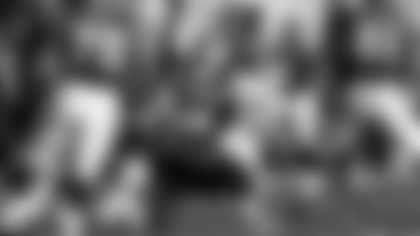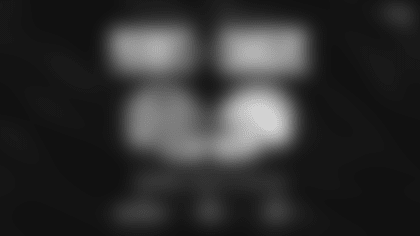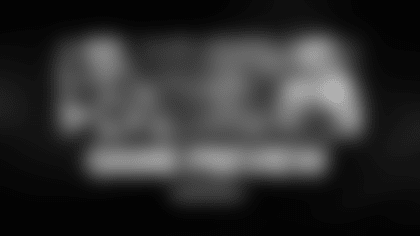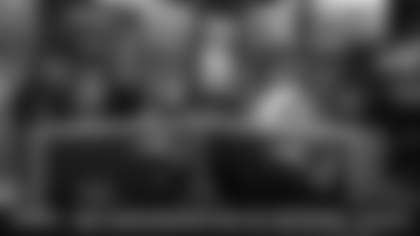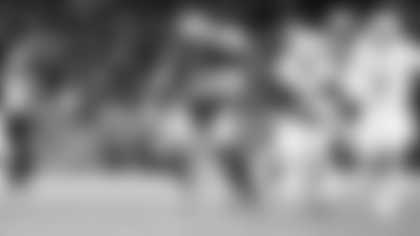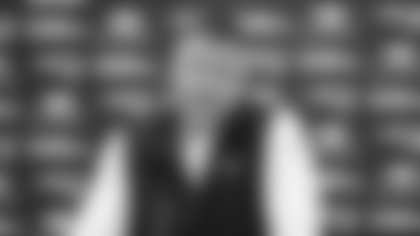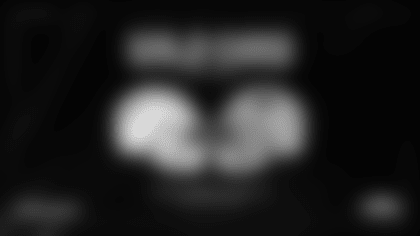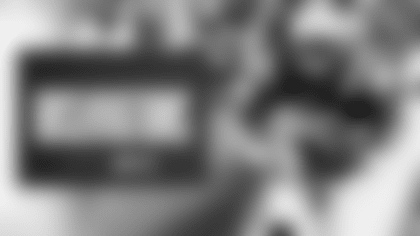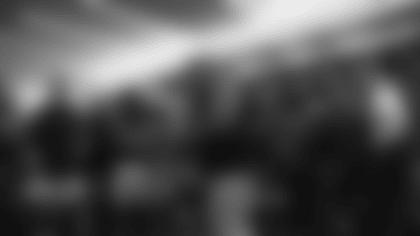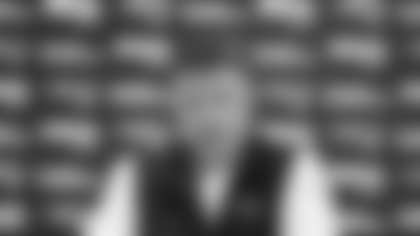[

]()
BB: With the bye for us this weekend today is kind of our game. We are going to try to keep a good level of practice and try to sharpen up as much as we can on our practice setting and use this as time to keep working on the refinement of some of the things that we feel like are important for us. We are still continuing with our preparations really on all three teams until we know for sure who it is, but hopefully we can have another follow-up to yesterday's practice, a good level of concentration and some good execution that will carry us forward in the next week.
Q: Is there contact in practice, tackling?
BB: Not tackling, but everything else.
Q: How do you monitor how guys go at the same speed, tough to simulate game speed, a high risk for injury?
BB: Right, exactly. You want it all at the same speed and we have been doing it all year in terms of having to show teams simulate another team's stuff and then our team running our plays against and you have to learn how to do that. That certainly is an acquired skill, it is not one that you just walk out there and do. On the other hand when you are running your plays against your defense then everyone can run them at the regular level of execution because they are not running cards, they are running plays that we should know how to run. That is one way to up the intensity and the speed level of practice a little bit and keep it on just what you are saying exactly the same level, which is important. The one thing you don't want to do is have guys going at different speeds. That's not a good formula.
Q: How do you breakdown your preparation?
BB: We have done some work on Miami and of the three teams we obviously know them the best.
Q: But do you have the scout teams running cards off of all three teams?
BB: No, we've introduced some principles…we haven't really given them a full scouting report on those teams, but we have run things in practice that reflect the principles and types of things that Baltimore and Oakland were trying to do with a little less emphasis on Miami. Not because we think any less of them as a team, but because I think any less of them as a team, but just because we are a little bit more familiar with them having played them in the next to last regular season game.
Q: Obviously the death of Dick Rehbein caused some changes on the coaching staff, you said in the past that you have done more work with the offense this year?
BB: Yes.
Q: In what areas?
BB: Mainly the quarterbacks. Charlie [Weis] coaches the quarterbacks, but I have some meetings with the quarterbacks when Charlie is really doing more coordinator type things with the rest of the team. We kind of split it up that way and we have been doing it that way really all year. We try not to screw them up.
Q: Has that helped you much, good experience?
BB: Through my career I have been involved on both sides of the ball. I coached offense for a couple of years in Detroit and worked with the offense in Cleveland as well as the defense. So yeah, I think it is always good to keep getting new ideas and see things from the other side. From year to year in the league things change anyway so, sure it is a good experience.
Q: Would you say compared to last year you have spent considerably less time with the defense?
BB: Yes. Last year I spent the majority of my time with the defense, this year I've spent the majority of the time with the offense. When I say majority over 50 percent.
Q: And it is mostly with the quarterbacks?
BB: Yeah. Their preparation for the game, the schemes that we face, the personnel, the strategies that other defensive coordinators or other defensive teams employ, how they would treat different formations or how they would treat different situations that type of thing, yup.
Q: How much does Romeo [Crennel] bring his defense to you during the week?
BB: We talk at the beginning of the week. In a normal week, Monday everybody is kind of usually scrambling around trying to get the things from the Sunday game all of the grading and stats and the thoughts from that game in place and then at the same time moving on to the next team and trying to get the scouting reports done and the different aspects. Each coach is responsible for a different aspect of the preparation. So Monday is kind of a day where everyone is scrambling around a little bit trying to get their feet on the ground and get a handle on what's coming up. Then Tuesday is more of the type of day where you can do more game planning where you get deeper into your opponent and try to get a better understanding of not only what they were doing, but also what match-ups are favorable for you. So usually we talk on Tuesday and then after we watch the tape on Wednesday we see those things on the field and see how some of them look or whether they look or it looks like we are having problems with them and then depending on how that goes sometimes we talk about Wednesday practice, sometimes we feel pretty good about the way things are going and it is a pretty short conversation and then do the same thing on Thursday when we start doing third down and some other situation things and then Saturday before the game we kind of pull it all together and, 'This is how we want to try to start the game and that type of thing.' But you know certainly the majority of it is Romeo's planning and installation and teaching it to the players and making sure that they are all on the same page and understand it. We talk more in a general overview. Sometimes we talk about personnel in terms of who might be available for the game or who might not or the inactives and that kind of thing so that we know as much in advance as possible how to plan, how to utilize our people the best we can.
Q: Looking back a couple of months ago when [Bryan] Cox came in the Monday after the Denver game and said that his leg was broken in two place and that he would be back this season, was there any consideration in putting him on injured reserve?
BB: No. A broken bone is generally a four to six week injury and that is what it is. It needs some time to calcify and become sticky as the doctors say and then after a period of five-six weeks then it is basically as strong as all of the other bones. So at that point in the season there was still, I forget how many games it was, but there were enough left where looking at four, five, six weeks in that range there were still a lot of football to be played after that. So that really wasn't a consideration.
Q: His prognosis was closer to being right than that one was?
BB: Well I think there is a difference between being out there and being effective as a player, but Bryan was running, I think he was running after about three weeks and starting to do a little straight ahead jogging and then increased that. I forget exactly how many weeks it was he missed, but I would say five. I can't remember, but it was somewhere in that neighborhood. I mean you can't heal a broken bone in ten days. Now if it a none-weight bearing bone like a finger or a hand or something then you can cast that up and deal with it, but when it is a leg that is a little bit different, ankles things like that.
Q: How about Antowain Smith?
BB: Yeah we held Antowain out yesterday, we will hold him out today. I think he can go out there and practice if we really wanted to push him through it, but we are trying to get over the hump a little bit on this one and…
Q: Is it the leg that he banged up against Miami?
BB: No actually I think it was a little bit of a different spot that he aggravated last week in practice. He bumped into a guy in practice, but it wasn't serious enough to keep him out of the game and if we were playing this weekend he would play.
Q: Certainly two weeks ago he had a strong game, I would assume there is no concern I mean he has had as many carries this year as the last two combined, no signs of wearing down?
BB: No I think really a little bit of the opposite. Antowain is the type of back that we have seen get stronger in the latter part of the game especially in a couple of the games we have been able to run the clock out in. Atlanta being one example where his latter carries produced more then the ones earlier and I think Antowain, as we have said all year, is a strong runner, he has got good durablility and good power. I don't know if he gets stronger or everybody else wears down a little bit, but in relative terms he seems to be just as strong a running back at the end of the game, Buffalo here, the first Buffalo game is another example where he ran over a couple of guys and made that long run that sealed the run.
Q: Is that the type of runner you prefer as opposed to maybe a shifty guy, it seems the guys that run that style do have more success later in the game?
BB: Well I don't know. I think, there is an old saying, 'There are a lot of different ways to skin a cat,' and I think there really are. I mean I don't think you can see Curtis Martin running like a 230-pound power back, yet he'll carry the ball at the end of the game as well as anybody and he has his own style and he is very good. So they come in different shapes and sizes. I think the main thing as a coach is that you have to understand the strengths of your back and also the strength of your line/tight ends, fullbacks, whoever the other blockers are that are involved there and try to blend those together and that is not always the easiest thing to do, but that's what you have to try to do. So if your running back is in the same style and mold as your fullback and your tight end and your offensive line then it is a lot easier to do then if you have an inside power running tailback and a fullback that is a speed guy who is a lot better blocking on the outside plays and not as good leading up inside on big linebackers and defensive linemen, but those marriages sometimes are a little bit harder to fit.
Q: Fullbacks rarely see the ball, Marc Edwards may be the exception there, but how has he been in terms of just being that power lead blocker?
BB: I think Marc has done a solid job. I think he is different from some of the other power fullbacks the Sam Gash's or the John Richie's or guys like that that just have a lot of weight and mass and can really run people over, but again Marc's game, I think it is an all-around game. It is carrying the ball, it is catching the ball, it's blitz pickup, pass protection, it is outside plays and it is inside plays. I think he does a pretty solid job in all of those areas. Maybe not the best in the league in any single one, but when you put them all together he is a pretty consistent player and he has made some key blocks for us at the point of attack both inside and outside. He has done a nice job on some of those outside plays where he is kind of lined up along the line of scrimmage almost like a tight end, where a tight end would be lined up and those blocking angles and that is a little bit different from blocking them in the backfield. His versatility has really been a big plus for us and that's part of the way Charlie likes to design the offense with a lot of multiple things so to have a flexible fullback like that has been a big plus for us.
Q: When you are down at the goal line what is the advantage of having him also as a tight end and to have a tight end a defensive linemen or a linebacker in the backfield as opposed to maybe the other way around?
BB: Again if you are going to run inside and you have a bigger lead blocker then you are able to sometimes move the pile or get a little more push on those inside plays. The problem with having a big, slow guy at fullback is when you try to get the ball outside the back outruns the lead blocker, but on the inside plays what you are really looking for, usually on the goal line most of your plays are inside plays, what you are really looking for is somebody that can move the line of scrimmage. So sooner or later you have to move the line of scrimmage to the defensive side of the ball and if you have a big, strong, physical guy that can go up in there and lead on a 240-pound linebacker or find a little crease there and push the pile then you are only looking for a yard or a half yard. That's the advantage to having a bigger fullback in that situation.
Q: How did the guys look in practice yesterday and was it markedly different than during the last bye week?
BB: Yes. It was better. I think the players were focused yesterday. I thought we had a good day of work. You know it wasn't perfect, but it I thought they came out there and put a good effort into it. There are some things we need to clean up and do a little bit better, but I think that the effort and the concentration overall was not bad.
Q: In speaking to some of the veterans they said it is was up to them to sort of set the tone and let the other guys know that this is a different week, have you sensed that?
BB: Yeah. I think definitely that a number of our veteran players have stepped forward between yesterday, even a little bit this morning. It's not just another week. It is a little special and we need to approach it that way and really we had that I think a little bit on Wednesday too even though it was a light practice in the bubble and some running kind of getting back into it. It's a little bit different in the playoffs and I think we all started to see it Wednesday and we saw it yesterday and hopefully we will see it today.
Q: Can you address the Terry Glenn situation?
BB: Well, really the comment I think we made on it yesterday about sums it up.
Q: You don't want to get into it a little bit more?
BB: I don't think there is really much more to say.
Q: How about your decision and meeting with him a month ago and let him back after several absences, do you look back at that and say maybe you should have done it then?
BB: No. I'm comfortable with what has, not the way it has worked out, but there were a lot of steps along the way. I tried to evaluate the situation and make the decision that I thought was best at that time and that's what I did yesterday.
Q: Are you disappointed at the end result?
BB: Yeah. Sure, this isn't the way I hoped it would end up, no.
Q: Do you feel like you gave him every single opportunity and showed as much patience as you possibly could?
BB: I tried to be fair in all the situations and the decisions that I made all year. So I mean this wasn't about…well, just leave it where it is.
Q: You've said all along, you said when you suspended him the first time in training camp that you hoped to have a long-term relationship with him…?
BB: Wait a minute. Hold it. Wait a minute. What? Give me that again now.
Q: When you put him on the Reserve/Left Camp list…?
BB: OK, all right, I didn't suspend him in training camp. All right.
Q: OK, you put him on the Reserve list?
BB: Right. OK.
Q: And you said about the long-term future…?
BB: Right.
Q: You said, 'I hope there is a next year and I hope we can build this here. Do you still feel that way?
BB: Yes. Yeah I do feel that way. And right now, today, tomorrow, the next day, is not the time to go into that. But at some point there will be a time and a place to discuss that and we'll take it up then.
Q: How much attention will you pay to the games this weekend? Will you watch them as a player, a fan or a combination of the two?
BB: Probably more of a coach than a fan, although TV scouting is tough. You can't…it's hard after you've watched a game on TV to come back and say, 'Well this is what they were doing and how they were doing it and that.' The TV scouting is tough. But no, as a coach I'll watch the Oakland/New York game tomorrow night and if Oakland wins, then we know who we are playing and we will be in here working on them early Sunday morning and we know that's the game we are getting ready for Saturday. If it doesn't go that way then we'll take a look at the two remaining teams that we can play and work on them Sunday until Sunday night it is determined which one of those our opponent will be. So we've kind of…you know we are going to take first things first and just sequentially that Oakland is the first team that we could know that we are going to play and that's the one that we'll prepare for first. But if it turns out not to be them then we'll have to do as much work as quickly as we can on the other two and there has been some preparation done on Baltimore and Miami as well. So it is not like we are starting from scratch, but we'd have to pick up the pace a little bit on those two teams.
Q: If Oakland turns out to be the team would you ending up blowing off the other games for now?
BB: Right. Yeah I think we'd deal with that later when we see what that could hold for us in the future. But Sunday I think our main, if it's Oakland, then Sunday our day is going to be spent on Oakland.
Q: Will you take notes while you watch the game at home or do you keep the family away or talk about it with your kids or what? How serious do you watch it at home?
BB: I think…
Q: Throw stuff at the TV?
BB: Yeah. There you go. Well when I am home sometimes I get a lot of help. I've got a 10 year old and a 14 year old and they have their feelings about the games.
Q: Are they dissecting and saying geez…?
BB: Yeah right, yeah. Why don't you do this and don't do that. So I get some help, you bet. Look, when I was 10 pro football was nothing. I mean it was nothing. Nobody…it wasn't a big deal. 1961, 1962 when I was 10, pro football was no big deal. It's a whole different ball game now.
Q: Gino Cappelletti would beg to differ.
BB: Well, you know, I respect the players that played, now don't get me wrong. Jim Brown and some of the greatest players that ever played the game played then, but in terms of fan interest and popularity and games on TV and ratings and all that. I mean there is no comparison to where the game has grown to now. So that was…the season was over at this point anyway. It had been over three weeks back in…those games were around Christmas, right? The 26th, 27th, there weren't any games in January. So pre-Super Bowl, yeah. So yeah think there is a lot more interest in pro football than there was back in those days. But no, they give me some help. I don't think I really, in all honesty, need to sit there and take notes on the game. I think if there is something that is that astounding I think I probably would be able to remember it. You know I mean if they are running no-huddle or if they are shifting the tight end all time or they are running two or three corner blitzes. I mean that kind of thing, I think. But the main thing I think you just see out of it is you get a little bit of a tempo of where the team is at and the pace of the game and if they are trying to do anything in terms of substitutions or, not particular substitutions, but just in general the pace of the game or how they are trying to attack, whether it is a lot of play-action passes or…those are the kinds of things you'd see in a game tape anyway. You just get a little bit of a jump on it. And sometimes there is an injury that they would cover a lot more closely in the game where the cameras are right there on the sideline showing what's going on with a player, whereas if you are watching game tape you never have access to that.
Q: When you were younger you spent a lot of time with your dad in the office. Do you wish you could do that with your kids? Do you wish it was like that?
BB: Yeah. Well, I do that sometimes. I do that. My kids have come in to work a few days and gone out to practice and that kind of thing. They've done it. I mean it was different when I was a kid. It was a different situation and you know college is different because, especially at the Naval Academy, those guys were in class until three o'clock. I mean they really were, you know, mechanical engineering and navigation and whatever all the stuff was they took. So the major part of the day was just coaches preparing for practice or watching film or that type of thing. You know our day starts at 7:30 or 8 in the morning. We've got the players all day. So it's a lot different setting than what it was in college. So it's a long day. I mean for a kid to come in the hours we come in and stay until we stay is a lot different than when I was a kid showing up at 2:00, fooling around in the office, knocking over the water cooler, going out to practice for an hour and a half, playing catch with [Roger] Staubach before practice, playing catch with [Joe] Bellino, I mean that kind of stuff.
Joe Bellino was…that's my idol. Believe me, nobody thought more of Joe Bellino than I did and still do for that matter. What a tremendous person, player, great athlete, great baseball player, great football player. Yeah he's the first, really he's the first football player that I remember. You know I would have been six, seven when…I mean there were other players, but he's the one that I can really remember seeing him score three touchdowns against Army in the '59 Army/Navy game and catching the pass against Missouri in the Orange Bowl, the diving catch he made in the end zone. You know plays like that still stick in my mind, that I'd have trouble remembering those from another game. So yeah, but I mean what a thrill it was as a kid to, and especially looking back on it, I mean I didn't know how lucky I was then. I mean you never know when you are that age, but what a thrill it was as a kid to go to practice and to see the type of people that you look up to on a football, on…those Navy football teams, to like up to people like Joe Bellino and Roger Staubach and Tom Lynch and Pat Donnelly and guys like that, Roland Brandquist, guys like that that were just…now you look at them and they are Hall of Fame. They are model players, model people, model citizens. Guys that couldn't really do any more with their lives and their careers than those guys have done. And you know when you are seven, eight, nine, 10 years old you just don't realize how special they are. But looking back on it, what great role models. You know to see Staubach come out to practice 20 minutes before everybody else, stay 20 minutes later and watch Tom Lynch at the end of practice stay out there and snap balls into the fence to work on his punt snapping and stuff like that. And then without even knowing it, just by osmosis as a kid you are learning, 'Geez that extra work, that pays off.' That's why these guys are good football players. That's why they are winning. I mean it's a great…it was a great example. And again I didn't realize it at the time, but looking back on it those were real strong impressions. I was pretty fortunate. Also, to be around coaches like Wayne Hardin and Rick Forzano and guys like that that came through the Naval Academy at that time, to have watched them coach and to see how they motivated players and coached players, Ernie George, those guys. They were, I mean they each had an impact and it was special


